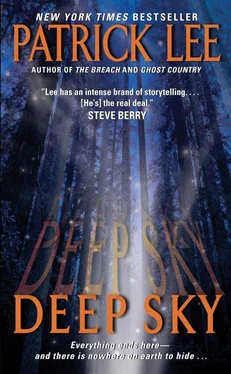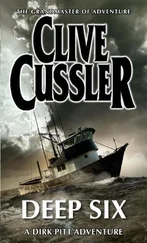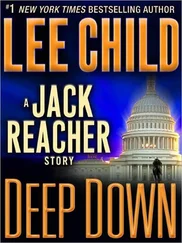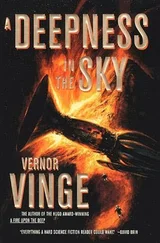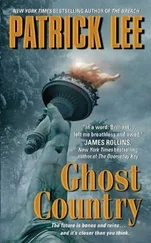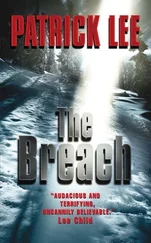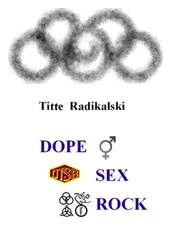The blood on the windshield was running down, each thick drop now a vertical line.
Travis turned to Paige.
Her left coat sleeve and the left side of her face were bloodier than the windshield.
But no more damaged than the windshield, either. It wasn’t her blood—a fact she seemed to be just verifying for herself. She turned in her seat and looked back at Carrie Holden.
Carrie wasn’t leaning forward over the console now. She was pressed against her own seatback, one hand to the lower left side of her abdomen.
Her fingers were soaked with blood.
“Jesus Christ,” Paige said. She repositioned herself so she was kneeling, facing Carrie; she switched on the dome light and bent down to study the wound.
Her first discovery was notable: the rifle bullet had clipped Carrie’s side—and fragmented in the decoy’s head. Most of which was now gone. As Travis looked more carefully at the blood on the windshield he saw that not all of it was blood. There was gray matter there. And a few chips of bone. He wondered if a death had ever mattered less to him.
He glanced back again and saw that Carrie had pulled up the bottom of her shirt to examine her own injury. It was all but superficial. The bullet had hit her so far to the side that it had almost missed—a quarter inch would’ve made the difference. The result was like a shallow knife slash to her side. Some bleeding, but no serious trauma. She let the shirt fall back over it and shoved the decoy’s body to the floor.
Travis glanced at Paige as she faced forward again. He saw her working out the pieces of what’d just happened.
“I guess it’s possible that whoever killed Garner could’ve found this place,” she said, “if they had the right connections. The government would’ve had no record of where you relocated to, Carrie, but they would’ve seen your name drop off Tangent’s personnel list in 1994. They’d know you were out there somewhere. In the past few years, facial geometry software could’ve probably narrowed DMV records to ten thousand or fewer. Narrow further by age and then look for a real-estate purchase or lease agreement in ninety-four, and they’d be in the ballpark. Wouldn’t take much legwork beyond that point. They might’ve found you five years ago and filed it away under useful .”
Carrie nodded. She looked emotionally drained, but still alert. “I used to be so careful about everything. Paranoid, even. After a while, it felt nice to think I didn’t have to be.”
Paige looked at Travis. “I think I was wrong earlier. The note they left for us—I don’t think they did expect us to understand it. Not in full, anyway. If they anticipated our showing up here, they must have known we’d be hard up for information about Scalar. They knew we’d come here to ask Carrie about it.”
“That makes the trap contradict itself,” Travis said. “Why set up a decoy to get information out of us, if we were only coming because we were clueless?”
He considered it for two seconds and then answered his own question.
“Confirmation. They believed we didn’t know anything, but they wanted to be certain. Like whatever it is they’re doing, they had to rule us out as a threat.”
Paige looked at him. “There’s no way they killed a president just to set all that up.”
“Not a chance. They’d need a bigger reason for that. This feels more like an afterthought.”
“Could the real reason involve putting Stuart Holt in power?” Paige said. “Maybe he’s involved. He’s the one who pointed the FBI toward us, ultimately leading us here.”
“It’s something to keep in mind,” Travis said.
They reached the end of the street and Travis took a left. Three blocks ahead lay Main Street, which was also Highway 550 running north out of town.
“I heard your introductions from the other room,” Carrie said. “Travis Chase. Paige Campbell.” A pause. “You’re Peter’s daughter.”
Paige looked back at her and nodded.
“I watched you grow up in photographs on his desk,” Carrie said. “You were fourteen when I left.” Again she paused. Then she said, “He’s dead, isn’t he? If he were alive, he wouldn’t have let you come here to ask me about Scalar.”
Paige nodded again.
Travis made the right onto 550. He could see the road extending ahead beyond the edge of Ouray, north into the darkness.
Then Carrie drew a hard breath with a shudder in it, and both Travis and Paige looked back at her. Travis had guessed the pain was getting worse, but she wasn’t wincing, and her hands were nowhere near the wound; they were relaxed on her knee.
The only thing tense was her face—with fear.
She looked at them both. “Is it really starting again? Everything Scalar was about?”
“Yes,” Travis said. “How much do you know about it?”
“Some. I know all about how it started. What led to it. Not much detail of the investigation itself. Peter was . . . hesitant to talk about it.”
“So I learned,” Paige said.
“Please tell us as much as you can,” Travis said. “Right now all we’ve got are questions.”
Carrie nodded. She sat there a moment putting her thoughts in order. When she spoke again, Travis could still hear the fear, though contained, subdued.
“The Scalar investigation was a cold case. It was cold even when Peter and the others started working on it in 1981. In a way, it was a manhunt, though they knew the man in question was already dead. Their goal was to learn about something he’d done just before he died—something that might have long-term consequences. The man’s name was Ruben Ward. I’m sure you’ve both heard of him.”
The name was instantly familiar to Travis, but he couldn’t place it. It was like trying to match an obscure actor’s name to a face or a role. He looked at Paige and saw no such struggle in her expression—she knew exactly who Ruben Ward was.
She glanced at him. “You read about him your first day in Border Town, in the journal down on Level 51.”
It came back to him before she’d even finished speaking. In the first hour Travis had spent in Border Town, more than three years earlier, Paige had given him a tour of the essentials. Which was to say she’d shown him the Breach. But first she’d taken him into a fortified bunker down the hall from it, and let him read a bloodstained notebook that dated to the Breach’s creation—March 1978.
That journal had been written by a man named David Bryce, a physicist and a founder of the Very Large Ion Collider project, which had once—very briefly after its completion—resided on the premises. Bryce had decided to keep an informal account of events at the VLIC: a journal that he and others could write in whenever they felt like it. The first entry had been jotted a few hours before the collider’s maiden test shot; Bryce’s tone had been lighthearted and hopeful. The same couldn’t be said for the rest of the entries.
The remainder of the journal chronicled not only the hellish first days after the Breach’s formation, but Bryce’s own descent into something like an animal mind-set, his cognitive functions and his inhibitions stripped away by exposure to the Breach—specifically the sounds that issued from it. Breach Voices, as they were now known.
The journal had also mentioned Ruben Ward, the man who had actually thrown the switch to initiate the VLIC’s first shot. The man who, in the strictest sense, had opened the Breach.
Ward had paid instantly for the privilege. According to the journal, he’d collapsed at the moment of the shot—possibly jolted by the switch or its metal housing—and never woke during the days that followed. Travis had heard a bit more about him afterward: Ward had been transferred to some hospital out east, still unresponsive, and ended up in a coma unit. That was as much as Travis knew. In all the time since he’d first heard the story, he’d never brought it up again. Neither had anyone else.
Читать дальше
